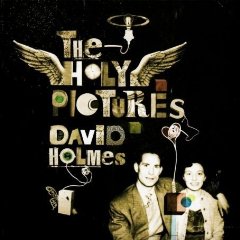His effort with The Free Association notwithstanding, David Holmes’ work as an overseer of movie soundtracks since his last album release, 2000’s Bow Down To The Exit Sign has contrived to obscure the fact that as an artist in his own right, Holmes is largely without peer. While his contributions to the Ocean’s Eleven and Out Of Sight brought his musical tastes and knowledge to a wider audience, his indelible mark had already been made via a history that has produced at least one indispensable album in the form of Let’s Get Killed and a DJ career that’s seen him fill floors with anything from rockabilly to Northern Soul to house to hip-hop to whatever the fuck he feels like dropping in order to get feet, hips and bodies moving.
Here indeed is a man of wealth and taste.
And yet, as Holmes himself would undoubtedly be prepared to admit, the line that separates homage from pastiche is paper thin and one of the hardest to navigate; influence is one thing, wholesale plundering is quite another and a mere slip in the wrong direction is enough to precipitate a terminal fall. Witness the rise of any number of witless goons thrown up in the slipstream of say, Oasis or Franz Ferdinand, who are only too eager to plunder music’s rich past without the slightest grasp of context or understanding.
Holmes’ ear for music is, unsurprisingly, cinematic and while the spice of funk provided the template for his previous releases, The Holy Pictures looks, as Bowie did over 30 years before him, to Europe for inspiration. Of course, this isn’t the first time Holmes has sought to gain motivation from this side of the Atlantic; Serge Gainsbourg has always loomed large, most notably on ‘Don’t Die Just Yet’, his re-working of ‘Melody’/’Cargo Culte’, but here, with his fourth solo outing, the Ulsterman has drawn deeply from the well of 1970s Krautrock.
This isn’t a question of tagging on a motorik beat and hoping for the best; The Holy Pictures shimmers in its use of sounds and textures and while the axis of Neu!, Cluster and La Düsseldorf provide the blueprint, Holmes makes no attempt to clean up the fingerprints he’s left dabbed all over the place. A more deeply personal record than any of its predecessors, Holmes examines his early life in Belfast and the relationships between him and his parents and for the first time, he carries the vocal burden himself.
Not the greatest of singers, his voice is nevertheless the only one that could take on such a delicate task. A half-whisper, the yearning contained within adds an immediate gravitas to the kosmische groove of ‘I Heard Wonders’. The combination of voice and a musical form previously unrelated to Holmes yet played so convincingly make for an instant jab and punch and it’s impossible to doubt his familial feelings when he intones, “You’re everything I’ve ever wanted to be” on the celestial hymn that is ‘Love Reign Over Me’ or the propulsive title track that sees him confirming, “I carry you inside of me”.
Like Fujiya & Miyagi and The Black Neon before him, David Holmes has tapped into source material often heard of but little listened to and has succeeded in making a statement that’s wholly his. Though Bowie’s appropriation of the form heralded a prophetic vision of things to come, Holmes’ compelling excursion is entirely appropriate as he looks over his shoulder to the past in order to reconnect with his present. A fine balancing act to be sure, but one completed without the aid or need of a safety net.


